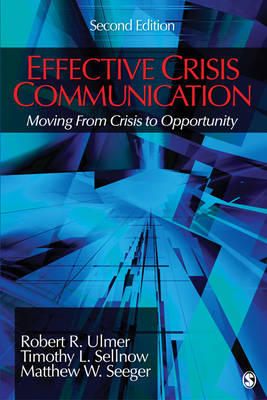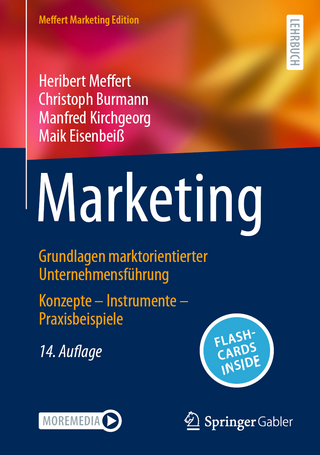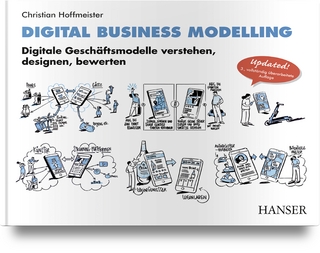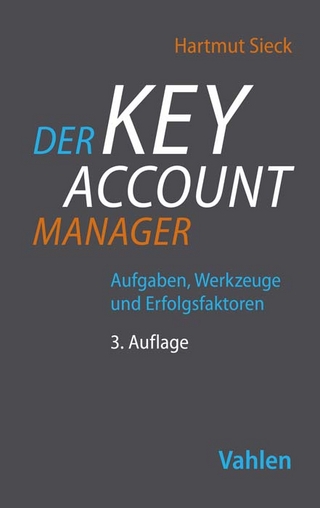
Effective Crisis Communication
SAGE Publications Inc (Verlag)
978-1-4129-8034-0 (ISBN)
- Titel erscheint in neuer Auflage
- Artikel merken
This book provides the reader practical advice on how to effectively manage and overcome a crisis. Authors Robert R. Ulmer, Timothy L. Sellnow, and Matthew W. Seeger provide guidelines for taking the many challenges that crises present and turning those challenges into opportunities for overcoming a crisis.
Key Features of this second edition:
•Brings together theory and experience: This book introduces readers to sound research and best practices in the field of crisis communication.
•Provides advice on how to create opportunity from crisis: Unlike other crisis communication texts, this book explains how organizations can and should emerge from crises as better organizations.
•Addresses prominent and diverse cases: Cases and practical applications from a wide variety of crises are included, such as food-borne illness outbreaks, terrorism, industrial disasters, and natural disasters. "You Make the Call" exercises allow readers to examine and critique the decisions made in such important cases such as 9/11, the 2003 California fires, the recent financial crisis, and the Swine flu pandemic.
Robert R. Ulmer is professor of Communication Studies and dean of the Greenspun College of Urban Affairs at the University of Nevada, Las Vegas. The Greenspun College of Urban Affairs’ mission is to create unique solutions to support community resiliency. His teaching, research, and advisory roles focus on producing effective risk and crisis communication through renewal, growth, and transformation. His current work involves creating transdisciplinary research solutions and engaging public/private partnerships to develop crisis-prepared and response-capable communities and organizations. Recently, the Greenspun College of Urban Affairs launched the MGM Resorts International Public Policy Institute. The Institute is bipartisan (the co-chairs are former Senator Harry Reid and former Speaker John Boehner) and focuses on creating innovative solutions to pressing national social crises. He is also involved in several research initiatives focused on tourist safety, smart cities, urban leadership, community trauma, and community resiliency. His recent and current work is funded by MGM Resorts International, the Centers for Disease Control and Prevention, and the Environmental Protection Agency. He has worked in an advisory role both nationally and internationally for a wide variety of public and private organizations during risk and crisis events. He has served as an advisor on several large-scale oil spills, issues of homeland security and terrorism, financial crises, environmental disasters, food safety crises, and public health and community crises. He has published articles in Management Communication Quarterly; Journal of Applied Poultry Research; Communication Yearbook; Journal of Business Ethics; Public Relations Review; Journal of Organizational Change Management; Journal of Applied Communication Research; Handbook of Crisis Communication, Argumentation, and Advocacy; Public Relations Review; Communication Studies; Handbook of Risk and Crisis Communication; Encyclopedia of Public Relations; International Handbook of Crisis Communication; Handbook of Crisis Communication; and Handbook of Public Relations. Timothy L. Sellnow is a professor of strategic communication in the Nicholson School of Communication and Media at the University of Central Florida in Orlando. Dr. Sellnow’s research focuses on instructional risk and crisis communication to diverse publics, and strategic communication for crisis management and risk mitigation in government, organizational, and health settings. He has conducted funded research for the Department of Homeland Security, the United States Department of Agriculture, the Centers for Disease Control and Prevention, the Environmental Protection Agency, the United States Geological Survey, and the World Health Organization. He has also served in an advisory role for the National Academy of Sciences and the Food and Drug Administration. His work on crisis, risk, and communication has appeared in the Handbook of Crisis and Risk Communication; International Encyclopedia of Communication; Communication Yearbook; Handbook of Public Relations; Handbook of Applied Communication Research; Public Relations Review; Communication Studies; Journal of Business Ethics; Journal of Business Communication, Argumentation, and Advocacy; Critical Studies in Media Communication; Journal of Applied Communication Research; Health Communication; Journal of Health Communication; Risk Analysis; Journal of Contingencies and Crisis Management; and Management Communication Quarterly. Dr. Sellnow is the coauthor of six books and coeditor of two books on crisis and risk communication, and he is the past editor of the Journal of Applied Communication Research and past recipient of the National Communication Association’s Gerald M. Phillips Award for Distinguished Applied Communication Scholarship. Matthew W. Seeger is currently professor of communication and co-director of the Center for Emerging Infectious Diseases at Wayne State University. Dr. Seeger’s research concerns crisis and risk communication, health promotion and communication, crisis response and agency coordination, the role of media—including new media—crisis and communication ethics, failure of complex systems, and post-crisis resilience and renewal. He has worked with the U.S. Centers for Disease Control and Prevention for more than a decade. He is a member of the World Health Organization Guidelines Development Group for Emergency Risk Communication. He has consulted with several Fortune 500 firms on crisis management planning and response. His work has been supported by the CDC, NCFPD, NSF, NIH, and the State of Michigan, with over $7 million in extramural funding. His work on crisis, risk, and communication has appeared in more than 100 peer reviewed articles and book chapters including the Handbook of Crisis and Risk Communication, International Encyclopedia of Communication, Journal of Health Communication Research, Health Promotion Practice, Communication Monographs, International Journal of Crisis and Contingency Management, Communication Yearbook, the Handbook of Public Relations, Handbook of Applied Communication Research, Communication Monographs, Public Relations Review, Communication Studies, Journal of Business Ethics, Journal of Business Communication, Management Communication Quarterly, Journal of Applied Communication Research, and the Journal of Organizational Change Management, among several others. Seeger is the author or coauthor of eight books, most focusing on crisis and risk communication, including Communication and Organizational Crisis (2003), Crisis Communication and the Public Health (2008), Effective Crisis Communication (2007), Effective Risk Communication (2009), Theorizing Crisis Communication (2021), Crisis and Emergency Risk Communication (Second Edition, 2015), Narratives of Crisis: Stories of Ruin and Renewal (2016), and the International Handbook of Crisis Communication (2016). He has advised over 40 doctoral dissertations.
1: Defining Crisis Communication
Defining Crisis Communication
A Definition of Crisis Communication
A Working Definition
Crisis and Risk
Types of Crises
The Significance of Crisis in a Global Environment
Defining Crisis Communication Theory and Practice
Crisis Communication Theories that Describe, Explain, and Prescribe
Understanding and Defining the Threat Bias in Crisis Communication
Summary
References
2: Lessons on Managing Crisis Uncertainty
Defining Uncertainty
Unexpected Crises and Uncertainty
Non-Routine Crisis Events and Uncertainty
Threat Perception and Uncertainty
Short Response Time and Uncertainty
The Impact of Crisis Induced Uncertainty on Stakeholders
Managing Communication Ambiguity Ethically During Crisis
Consistent Questions of Ambiguity
Training, Simulations, and Uncertainty
Belief Structures and Uncertainty
Summary
Lessons on Uncertainty and Crisis Communication
References
3: Lessons on Effective Crisis Communication
Determining Your Goals
Partnering with Crisis Audiences
Understanding the Diversity of Your Audiences
Primary and Secondary Stakeholders Defined
Communicating with Under Represented Populations During Crisis
A Word on Partnerships and Listening
What Information Do Stakeholders Need Following a Crisis?
Is Certain Communication Always the Best Approach?
Be Careful of Over-Reassuring Your Stakeholders
Tell Your Stakeholders How to Protect Themselves
Reducing and Intensifying Uncertainty Before, During, and After Organizational Crises: A Summary of Research and Practice in Crisis Communication and Generating Renewal
Social Media and Effective Crisis Communication
The Power of Positive Thinking
Summary
Lessons on Communicating Effectively in Crisis Situations
References
4: Lessons on Effective Crisis Leadership
The Importance of Effective Leadership
Why Visibility Following a Crisis is Important
Developing Networks of Support
Being Available, Open, and Honest
The Impact of Leadership on Renewal Following a Crisis
Ineffective Leadership During a Crisis
What Makes an Effective Crisis Leader?
Leadership Virtues
Managing Uncertainty, Responding, Resolving, and Learning from Crisis
Summary
Lessons on Effective Crisis Leadership
References
5: Examples of Success and Failure During Industrial Accidents
Lessons on Uncertainty: Tennessee Valley Authority and the Kingston Ash Slide
Missed Opportunities in Crisis Preparation and Planning
TVA’s Response to and Uncertain Crisis
You Make the Call
Lessons on Uncertainty and Crisis Communication (You Make the Call)
Summary
Lessons on Effective Crisis Communication: A Plant Fire at Malden Mills
Courageous Communication in the Wake of a Disaster
You Make the Call
Lessons on Communicating Effectively in Crisis Situations (You Make the Call)
Summary
Lessons on Leadership: A Fire at Cole Hardwoods
Leading Instinctively After a Disaster
You Make the Call
Lessons on Effective Crisis Leadership (You Make the Call)
Summary
References
6: Examples of Success and Failure During Outbreaks of Foodborne Illness
Lessons on Uncertainty: King Car’s Response to the 2008 Melamine Crisis
Reducing Crisis Uncertainty
A Guiding Vision for King Car’s Crisis Communication
Initial Crisis Communication
The Recall
Critical Acclaim
You Make the Call
Lessons on Uncertainty and Crisis Communication
Summary
Lessons on Effective Crisis Communication: Long Term Complexities in the Tainted Odwalla Apple Juice Crisis
Challenges for Multiple Stakeholders
Odwalla’s Crisis Response
Impact on Stakeholders
You Make the Call
Lessons on Communicating Effectively in Crisis Situations
Summary
The Largest Food borne Illness Outbreak in History: Schwan’s Sales Enterprises
Schwan’s Crisis Response
You Make the Call
Lessons on Effective Crisis Leadership (You Make the Call)
Summary
References
7: Examples of Success and Failure in Response to Terrorism
Crisis Uncertainty: The Case of 9/11
You Make the Call
Managing Uncertainty During Terrorism: Lessons on Uncertainty and Crisis Communication
Summary
The Oklahoma City Bombing
You Make the Call
Communicating Effectively And Ineffectively During Terrorism: Lessons on Communicating Effectively in Crisis Situations
Summary
Leadership During a Terrorist Attack: Coping with 9/11 by Rebuilding
Cantor Fitzgerald’s Pre Crisis Reputation
Howard Lutnick’s Crisis Response
Reservoir of Good Will
Post 9/11: Recovery, Remembrance, and Renewal
You Make the Call
Leadership Successes And Failures during Terrorism: Lessons of the Role of Leaders in Crisis Situations
Summary
References
8: Examples of Success and Failure During Natural Disasters
1997 Red River Valley Floods
Communicating to the Public about Crest Levels
You Make the Call
Lessons on Uncertainty and Crisis Communication (You Make the Call)
Summary
Rural Renewal after a Tornado in Greensburg, Kansas
Initial Framing of the Crisis
Consequences of a Bold Environmental Vision Following the Tornado
Community Response
You Make the Call
Lessons on Communicating Effectively in Crisis Situations
Summary
Hurricane Katrina
You Make the Call
Lessons on Effective Crisis Leadership (You Make the Call)
Summary
References
9: Examples of Success and Failure During Financial Crises
Enron
Leadership Communication
Divergent Corporate Values
Responsibility to be Informed
Openness to Signs of Problems
You Make the Call
Managing Uncertainty During Financial Crises: Lessons on Uncertainty and Crisis Communication
Summary
References
Lessons on Effective Crisis Communication: A Costly Youtube Hoax for Dominos Pizza
Unusual Challenges for Dominos
Dominos Crisis Response
You Make the Call
Communicating Effectively and Ineffectively During Financial Crises: Lessons on Communicating Effectively in Crisis Situations
Summary
References
Rising from the Wreckage: General Motors and the Crash of 2008-2009
General Motors Initial Response to the Crisis
A Second Attempt to Respond to the Crisis
Bankruptcy at General Motors
Televising and Promoting and New Vision at General Motors
Leadership Successes and Failures During Financial Crises: Lessons on Effective Crisis Leadership
Summary
References
10: Learning Through Failure
Failing to Learn from Failure
Learning Through Failure
Vicarious Learning
Organizational Memory
Unlearning
Summary
References
11: Risk Communication
Distinguishing Between Risk and Crisis
Identifying Risk
Analyzing Multiple Audiences
Convergence Theory and Risk Communication
Responsible Risk Communication
Summary
References
12: Responding to the Ethical Demands of Crisis
Ethics
Corporations as Moral Agents
Values
Values and Crisis
Responsibility and Accountability
Access to Information
Humanism and Care
The Role of Values in a Crisis Response
Summary
References
13: Crisis as Inspiring Renewal through Effective Crisis Communication
Considering the Opportunities Associated with Crisis
Theoretical Components of the Discourse of Renewal
Understanding Renewal: Consequences of Considering Opportunities During Crisis
Understanding the Misconceptions Associated with Crises and Crisis Communication
Summary
References
| Erscheint lt. Verlag | 11.1.2011 |
|---|---|
| Verlagsort | Thousand Oaks |
| Sprache | englisch |
| Maße | 152 x 228 mm |
| Gewicht | 370 g |
| Themenwelt | Sozialwissenschaften ► Soziologie |
| Wirtschaft ► Betriebswirtschaft / Management ► Marketing / Vertrieb | |
| Wirtschaft ► Betriebswirtschaft / Management ► Unternehmensführung / Management | |
| ISBN-10 | 1-4129-8034-8 / 1412980348 |
| ISBN-13 | 978-1-4129-8034-0 / 9781412980340 |
| Zustand | Neuware |
| Haben Sie eine Frage zum Produkt? |
aus dem Bereich



